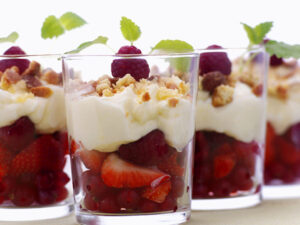Prebiotics and Probiotics: Creating a Healthier You
Table of Contents

You’ve probably heard of prebiotics and probiotics, but do you know what they are? Nutrition research has pinpointed specific functional components of foods that may improve health, and prebiotics and probiotics are two such substances.
Although they are available as dietary supplements, it is not necessary to use special pills, potions, cleanses or other concoctions to incorporate prebiotics and probiotics into your daily intake. These “nutrition boosters” are natural ingredients in many everyday foods.
While research continues in this area of nutrition — investigating how effective and safe these substances are and how much we need to obtain health benefits — here’s what we know now.
What Are Prebiotics and What Do They Do?
Prebiotics are naturally occurring, non-digestible food components that are linked to promoting the growth of helpful bacteria in your gut. Simply said, they’re “good” bacteria promoters. That’s right, not all bacteria are bad! Prebiotics may improve gastrointestinal health as well as potentially enhance calcium absorption.
Prebiotics in Your Diet
Prebiotics include fructooligosaccharides, such as inulin and galactooligosaccharides. But rather than focusing on these lengthy words, include more prebiotics in your day by eating more fruits, vegetables and whole grains such as bananas, onions, garlic, leeks, asparagus, artichokes, beans and whole-grain foods.
What Are Probiotics and What Do They Do?
Probiotics are the “good” bacteria — or live cultures — like those naturally found in your gut. These active cultures help change or repopulate intestinal bacteria to balance gut flora. This functional component may boost immunity and overall health, especially GI health. For instance, probiotics have been used for management of irritable bowel syndrome symptoms.
Probiotics in Your Diet
To include more probiotics in your eating plan, look to fermented dairy foods including yogurt, kefir products and aged cheeses, which contain live cultures such as bifidobacteria and lactobacilli. Also consider fermented, non-dairy foods with beneficial live cultures, including kimchi, sauerkraut, miso, tempeh and cultured non-dairy yogurts.
What Makes Prebiotics and Probiotics the “Dynamic Duo?”
Ultimately, prebiotics, or “good” bacteria promoters, and probiotics, the “good” bacteria, work together synergistically. In other words, prebiotics are breakfast, lunch and dinner for probiotics, which restores and can improve GI health. Products that combine these together are called synbiotics. On the menu, that means enjoying bananas atop yogurt or stir-frying asparagus with tempeh is a win-win.
Incorporating health-promoting functional foods, such as those containing prebiotics and probiotics, aids in creating a healthier you.
For specific advice on obtaining prebiotics and probiotics for your own specific health needs, especially if you have GI issues or a weakened immune system, contact a registered dietitian nutritionist


 Log In
Log In